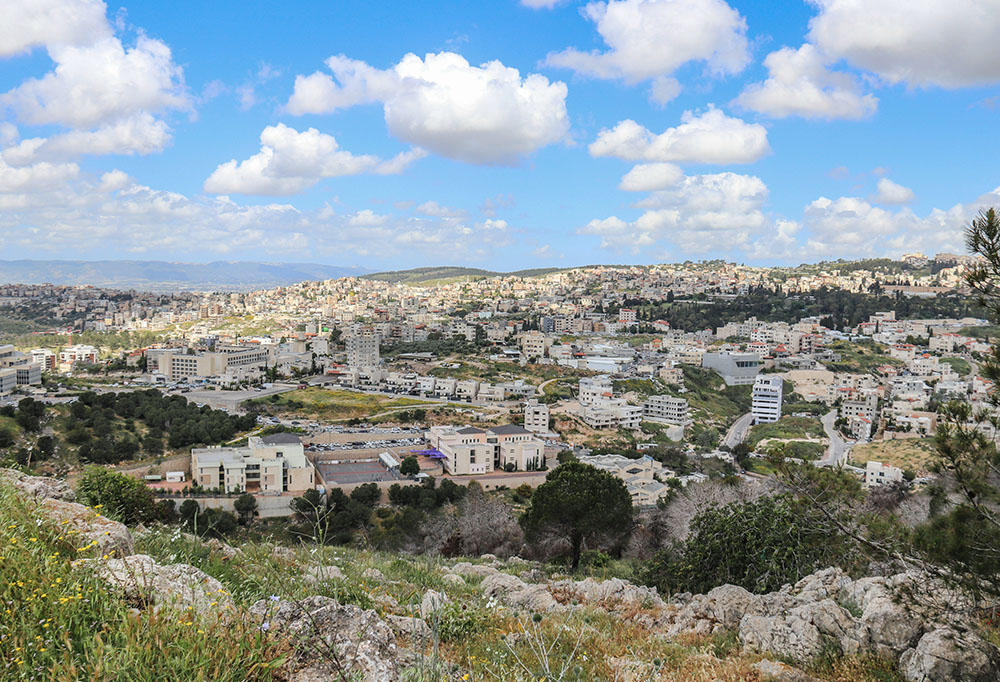
A view of Nazareth, Israel, is seen in an undated photo. (Wikimedia Commons/Shalev Cohen)
The daily routine of my life at the Salvatorian Sisters' School in Nazareth, Israel, used to be lively, with kids arriving at school with broad smiles. Children from lower grades ran toward teachers and sisters to give and receive warm, cozy hugs. Students from higher classes arrived on time and cherished the quiet moments on the school campus or got lost in the world of mobile devices.
But the present situation, of which the world is already aware, involves the horrifying war that broke out in the Middle East after Hamas terrorists attacked Israel, which has made the lives of everyone in the country topsy-turvy.
At once, life froze and daily living costs went high. People's lives were under threat and schools were shut down. The Promised Land, once flowing with milk and honey, transformed into the flowing of blood and death. Every new morning became a nightmare for many, with no guarantee of survival for one more day. All were gripped by fear and insecurity. But ...
Thank God the government was well-prepared for this chaos, and it issued many grants for people who lost their jobs and so could not afford to meet their basic needs. Another positive thing is that COVID-19 has prepared the education system to master helping students through Zoom classes.
But the unexpected siren sounds scared everyone, especially the students, though they'd had regular drills in the past to learn how to escape to the safe rooms as soon as they heard the siren from the school. During the year, this practice was a must in the school. Once in a while, out of the blue, the siren went on, and the students had to run to their allocated safe rooms. But no one dreamed this would become a reality so fast.
Fortunately, the Israelis are prepared to have bunkers in their vicinity in case they do not have this facility in their homes. And if people built their houses within the last few years, a safe room was an obligation.
After a few weeks of fear and insecurity, the authorities allowed us to open schools, and slowly, the ambition of living a normal life returned, though people still feared unexpected attacks from neighboring countries. This had a great impact on everyone's life. It was difficult to know who was next to you, if you could trust another person or if they were there to hurt you.
Advertisement
As for me, I used to walk to the Basilica of the Annunciation for daily morning eucharistic celebration, and suddenly I was told not to walk alone early in the morning. This itself created a fear in me that I never experienced before.
I then realized there was a feeling of mistrust among the students in the school. We have a 25% Muslim student population, and suddenly non-Muslim students began pointing at Muslim students as if the conflict was their fault.
Whenever I encountered students with such issues, I met with them to explain that in the school campus we are a big family, united as one and we don't point out anyone based on their religion and no one has a right to blame or judge the other. After my explanation, they often smile and shake hands with the other or give them a hug.
We also arranged a peace prayer in the school to help them understand that as a school campus, we all are equal, and we do not blame anyone based on religion. After explaining the meaning of living in harmony and respecting each other, we lit the peace candle, which remains burning throughout these dark days of war.
The peace candle is a symbol that proclaims a greater power than the suffering and sorrow that surrounds us. Our concern to stand with those who are suffering at the borders of Israel and Gaza invites us to shine the light of Christ more brightly. When we light the peace candle amid the suffering of war, we offer the promise of God to those who need it most. And pray together with one voice: "Lord, heal our world and grant us your peace, and start with me."
May these experiences help us understand the taste of inner death in facing challenges and grant us new hope in our daily lives to experience the resurrection of our Lord in our personal lives as well as in the lives of every individual in the whole world.







